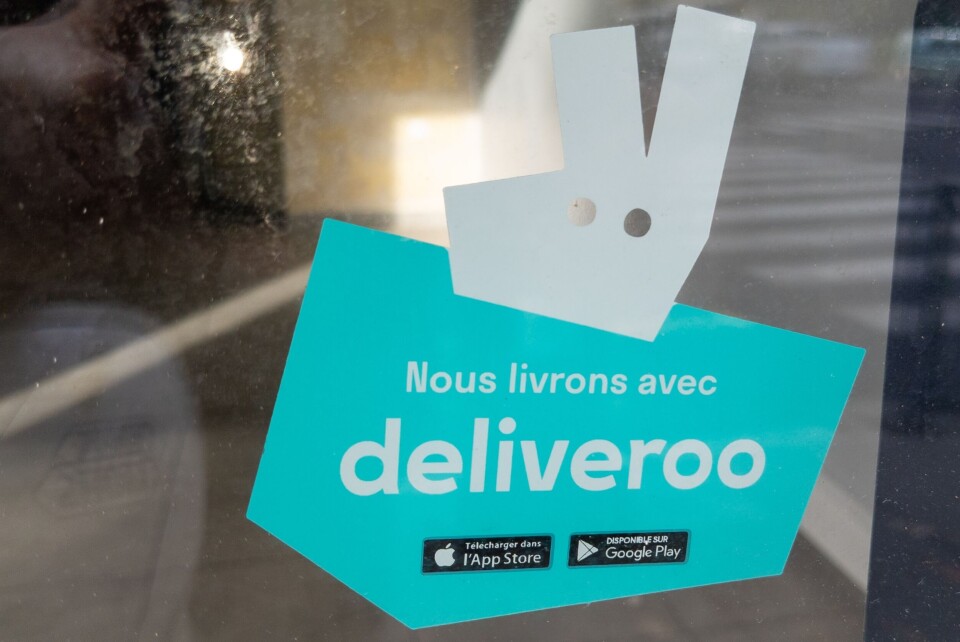-
Loire Valley Sancerre vineyard boosted by Taylor Swift documentary cameo
Disney+ documentary puts family vineyard in the international spotlight
-
39 bombs wash up on Gironde beach following World War Two bunker collapse
Shells were defused by experts but prefects warn others may remain
-
French airports request EES rollout suspension this summer
Risk of congestion feared if April full deployment of system for all eligible passengers takes place
Deliveroo France on trial in Paris for abuse of freelance work status
‘Independent’ delivery staff had a list of obligations and work conditions, including a uniform, that meant they should have been salaried employees, a gendarmerie report found

Food delivery company Deliveroo France and three of its former directors will go on trial in Paris from today (March 8), accused of “undeclared work”, in the first trial of its kind in the country.
The suspects are accused of employing delivery staff as “independent freelancers” when they should have been salaried workers with paid holiday and other benefits.
The trial is set to last until March 16.
Report: ‘Freelancers had no freedom’
It comes after gendarmerie employment investigation office l'Office central de lutte contre le travail illégal found that “the subordination” between Deliveroo France and its more-than 2,000 delivery drivers was “well-established”.
It said that the so-called “freelance” workers actually had “no freedom” in the organisation of their work.
The investigation took place between 2015-2017.
The report found that Deliveroo France, the French division of the UK tech company, had “falsely presented itself” as a platform that simply “put in touch” clients, restaurants, and delivery drivers, when in reality, delivering food was the “purpose itself” of its activity.
The investigation found that Deliveroo contracts state that the company uses “subcontractors”, as it does not have "in-house" staff with the "technical" and "particular know-how" required for delivering food.
However, investigators said that delivery driver testimonies appeared to reject this claim, with some anonymously saying: “[Food delivery is] the easiest thing in the world. You just have to know how to ride a bike.”
And while the delivery staff were considered to be freelancers, the investigation found that they were still subject to strict rules.
These included being allocated strict work “slots” according to their “performance” and geographical location at the time, as well as being required to wear the Deliveroo uniform, entering restaurants with the Deliveroo-branded backpack visible, as well as checking orders, and being required to remove their helmets when dealing with customers.
This list of demands was considered to be particularly detailed for a “freelancer”, who is usually considered to be independent, the report found.
And, until spring 2017, Deliveroo drivers were not able to decline orders that had been assigned to them. Any drivers that ignored Deliveroo’s calls were then considered to be in “serious breach” of their working contract, the report found.
These rules are more akin to the working requirements expected of a full-time, salaried employee rather than a supposed “independent freelancer”, the report suggested.
Deliveroo was also found to be acting as a “boss”, as it regularly issued reprimands and “reminders” to staff whose “statistics” were lower than considered acceptable, It also said that Deliveroo regularly issued “invoices” [of what they owed] to delivery drivers, which the investigators said resembled pay by “payslip”.
One delivery driver claimed: “I never questioned it. They manage us as if they were our bosses, they are the ones who pay us.”
A lawyer representing 70 delivery drivers in the case said: “Today is Deliveroo's trial, but it is above all a warning to all companies that operate on the same principle, and abuse the status of self-employment”.
In its defence, Deliveroo France told the AFP: “Deliveroo works with self-employed delivery drivers because it is in line with the way they tell us they like to do their business. This gives them a flexibility that they could not enjoy in a salaried relationship.”
Gig economy employment issues
However, several “gig economy” companies have encountered problems with this employment status in recent years.
In the UK, “ride-sharing” company Uber has granted its 70,000 drivers a hybrid status of “salaried workers”, which means they are technically “freelance”, but still have access to a minimum wage guarantee, paid holidays, and a pension fund. This was a first for a US-based company.
Uber is also under investigation for a similar case of “undeclared work” in France.
Deliveroo was founded by entrepreneurs Will Shu and Greg Olowski in 2013 in London, UK, and now describes itself as an “algorithm” platform that is “based on powerful predictive technology that evaluates the most efficient way of distributing orders based on the location of restaurants, riders and customers”.
Related articles
Massive shows of police strength suit Macron for re-election bid
Paris police officer who insulted sexual assault victim suspended
























